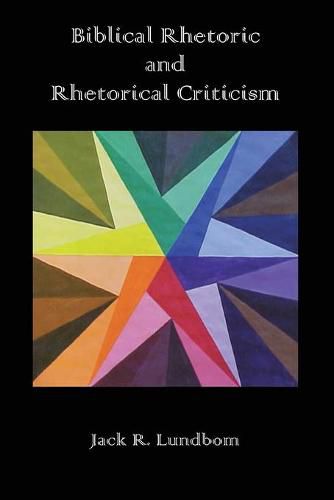Readings Newsletter
Become a Readings Member to make your shopping experience even easier.
Sign in or sign up for free!
You’re not far away from qualifying for FREE standard shipping within Australia
You’ve qualified for FREE standard shipping within Australia
The cart is loading…






This title is printed to order. This book may have been self-published. If so, we cannot guarantee the quality of the content. In the main most books will have gone through the editing process however some may not. We therefore suggest that you be aware of this before ordering this book. If in doubt check either the author or publisher’s details as we are unable to accept any returns unless they are faulty. Please contact us if you have any questions.
This volume will prove a classic textbook on rhetorical criticism in the Bible, especially the Hebrew Bible. Following the lead of the famous Presidential Address to the Society of Biblical Literature in 1968 by James Muilenburg, ‘Form Criticism and Beyond’, Jack Lundbom has for over 40 years been developing and shaping the field with a stream of papers. Twenty-six of them (three not previously published) are gathered into this volume. Hebrew rhetoric has a long history, reaching back even into the early Israelite period. Recognition of rhetorical elements in the Bible can be seen in Hillel, Augustine, ibn Ezra, and Calvin, as well as among certain biblical scholars of the 18th and 19th centuries. But the revival of rhetoric and the modern method of rhetorical criticism is more recent, having begun in America among classical scholars in the early 1900s, and having been widely adopted by biblical scholars in the last third of the twentieth century. Biblical scholars today invariably have rhetorical criticism in their exegetical toolbox, but the field lacks such a comprehensive corpus of studies as the present volume supplies. Reading the Bible with an eye to the rhetorical nature of its discourse-not just the style, but its structures and modes of argumentation-gives one a sharpened view of biblical figures, their legacy, and much else in the biblical text. One also gets new insight into the audiences for whom biblical messages were originally intended. Rhetorical criticism offers a ready yield for all those seeking a closer understanding of the biblical texts.
$9.00 standard shipping within Australia
FREE standard shipping within Australia for orders over $100.00
Express & International shipping calculated at checkout
This title is printed to order. This book may have been self-published. If so, we cannot guarantee the quality of the content. In the main most books will have gone through the editing process however some may not. We therefore suggest that you be aware of this before ordering this book. If in doubt check either the author or publisher’s details as we are unable to accept any returns unless they are faulty. Please contact us if you have any questions.
This volume will prove a classic textbook on rhetorical criticism in the Bible, especially the Hebrew Bible. Following the lead of the famous Presidential Address to the Society of Biblical Literature in 1968 by James Muilenburg, ‘Form Criticism and Beyond’, Jack Lundbom has for over 40 years been developing and shaping the field with a stream of papers. Twenty-six of them (three not previously published) are gathered into this volume. Hebrew rhetoric has a long history, reaching back even into the early Israelite period. Recognition of rhetorical elements in the Bible can be seen in Hillel, Augustine, ibn Ezra, and Calvin, as well as among certain biblical scholars of the 18th and 19th centuries. But the revival of rhetoric and the modern method of rhetorical criticism is more recent, having begun in America among classical scholars in the early 1900s, and having been widely adopted by biblical scholars in the last third of the twentieth century. Biblical scholars today invariably have rhetorical criticism in their exegetical toolbox, but the field lacks such a comprehensive corpus of studies as the present volume supplies. Reading the Bible with an eye to the rhetorical nature of its discourse-not just the style, but its structures and modes of argumentation-gives one a sharpened view of biblical figures, their legacy, and much else in the biblical text. One also gets new insight into the audiences for whom biblical messages were originally intended. Rhetorical criticism offers a ready yield for all those seeking a closer understanding of the biblical texts.